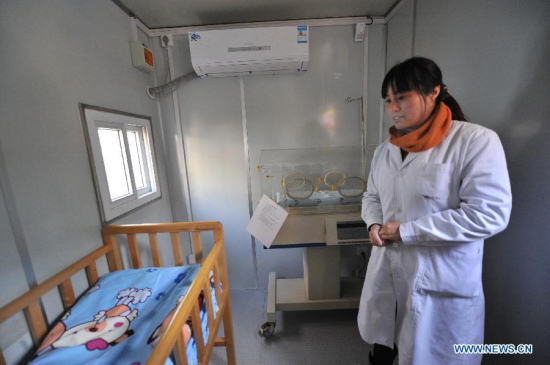

Photo taken on Dec. 11, 2013 shows the interior of the baby hatch in Nanjing, capital of east China's Jiangsu Province. The first baby hatch of Nanjing City was set up and put into use near Nanjing Children Welfare Center recently. The haven received an abandoned infant on Dec. 10. (Xinhua/Shen Peng)
China's controversial baby hatch program for unwanted infants is now struggling to find a way forward due to mounting financial pressure and staff shortages.
A baby hatch allows a parent to safely and anonymously abandon an infant and consists of an incubator, a delayed alarm device, an air conditioner and a cot. A baby is left in the hatch and welfare staff will retrieve the child within 10 minutes.
On Wednesday, local authorities in Quzhou City in the eastern province of Zhejiang told Xinhua that the province's first baby hatch, in Quzhou, had recently become a "policy consultant center for children in need" and had been moved from its former location outside a local hospital to inside a welfare center.
Meanwhile, it no longer was accessible around the clock access, instead it was only "open" during regular working hours and, according to the welfare center, it will be closed on weekends.
"The baby hatch is not closing," the center assured. "The function of the hatch has been upgraded, as it will also include policy promotion and consultation."
Since its debut, the baby hatch program has courted a storm of backlash, with many believing that the practice encouraged abandonment. Others, however, argue that the hatch program demonstrated social progress as it protected infants.
The sudden change of the baby hatch in Quzhou, less than a year into its operation, has led some to suspect that it is shutting down, after several other hatch programs were closed or suspended.
An employee with the welfare center said the program drained human resources, as staff had to be on call to supervise the baby hatch.
"At one point we all had to go to the baby hatch. This really disrupted our regular work at the welfare center," the source said.
The number of babies being left was another challenge. Many parents struggling with medical expenses for their disabled infants came in groups from other provinces to leave their babies."
"This caused enormous pressure on our facility," according to the source.
Luo Wenkun, deputy head of the local civil affairs bureau, admitted that the Quzhou baby hatch had struggled with financial difficulties in the past year.
Quzhou's baby hatch is not an isolated case. Hatch programs in the cities of Guangzhou, Jinan and Xiamen have all been shut down or suspended due to financial difficulties and staff shortages. Guangzhou in the southern province of Guangdong was the first to suspend its program, as it received more babies than any other major city.
To help the program, more supportive measures are needed, while the aid system for disabled children and their families must be reviewed, said Gao Huajun, a professor with Beijing Normal University.
"Aid should be given to the whole family. The family unit is crucial to providing a healthy and happy environment for handicapped children," said Guan Xinping, a professor of social welfare and policy from Nankai University.
China's baby hatches are currently still on a trial run. The first baby hatch was established in June 2011 in Shijiazhuang, capital of the northern province of Hebei. Since a government document in July 2013, 32 hatch programs have been established across 16 provinces.
Surge in birth defects overwhelms Guangzhou baby hatch
2014-04-16Infant abandoned on road after Guangzhou shuts baby hatch
2014-03-26Guangzhou suspended baby hatch
2014-03-18Baby hatch suspended as too many babies abandoned
2014-03-17'Baby hatch' halted in Guangzhou
2014-03-17First baby hatch put in use in Nanjing, E China
2013-12-12Copyright ©1999-2018
Chinanews.com. All rights reserved.
Reproduction in whole or in part without permission is prohibited.